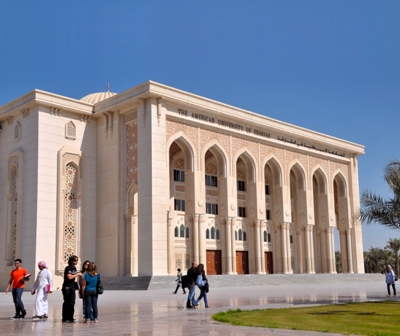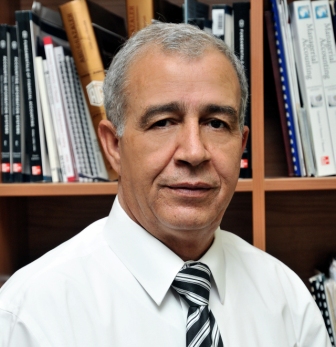As American University of Sharjah launches first-of-a-kind Master of Science in Accounting, the Head of Accounting at the school – Professor Taisier Zoubi – tells us what makes the qualification tick.
Q. In today’s competitive job market, a credential next to one’s name can help their resume stand out. Why is the Master of Science in Accounting (MSA) degree a necessity for anyone pursuing a career in accounting?
A. Employers seek professional accountants who are part of the management team. MSA degree holders provide assurances that employers are hiring individuals who are thinkers and add value to the enterprise and not just to provide bookkeeping services.
An MSA in Accounting is considered to be the terminal degree for professionals who are not pursuing teaching career. As a result, an accountant who is seeking a higher position in the top corporate ladder or government will pursue the MSA.
What courses are included in the Master of Science in Accounting programme?
To earn the MSA degree, each student must complete 18 credits of required accounting courses, six credits of accounting electives and six credits of general business (MBA) electives. Accounting courses include, but not limited to, advanced financial reporting topics, advanced auditing and attestation services, topics in international accounting, fraud examination, and international taxation among others.
Most of the Master programmes offered by institutions require work experience from prospective applicants. So, working professionals, fresh students, business starters – Who should take the Master of Science in Accounting course? What kind of profile is your programme looking for?
Our MSA programme is geared toward professional accountants who are looking to advance in the upper level of the corporate ladder and those students who are pursuing professional certifications in accounting such as the CPA, CMA, and CIA. In addition, the programme adequately trains those who are inspired to pursue a Doctorate degree for careers in academia and research.
Some say that the education taught in classrooms is different from the actual on-the-job skills necessary for success. As an educator, do you think there needs to be continuous adjustments in the education curriculum to bridge the gap?
As a matter of fact, our MSA program can be distinguished from other degrees based on the ground that we expose our students to real life cases. Furthermore, our graduate courses are updated continuously to incorporate new accounting rules; regulations and standards to ensure that our students can cope with the ever-changing accounting profession. In addition, many of our faculty have practical experiences and thus bring practical issues to the classroom through the use of cases and changes in professional standards.
Accounting has evolved from its initial traditional functions and developed into a broad field encompassing a number of disciplines including book keeping, auditing, taxation, forensic accounting, new standards etc. When admitting potential students into your programme, do you really consult with them to understand what their individual needs are in terms of their interests, roles and sectors where they work, in order to tailor their courses accordingly?
Our MSA programme has three different specialisations (Auditing, Forensic Accounting, and International Taxation) and other areas in accounting such as oil and gas that potential students can choose from. Hence, once a student is admitted, we meet with him/her in order to draft a plan of course work that meet his/her career needs.
Today’s accounting and finance professionals must possess knowledge, experience, and a well-developed set of technical skills to meet the challenges of a wide range of business environments. Are these challenges adequately addressed by your Master of Science in Accountancy (MSA) programme?
Changes in professional standards and technology are defining the accounting profession. We are continuously striving to bring in these changes to the classrooms. One example, the American Institute of CPAs has overhauled its auditing standards to converge with International Standards on Auditing. Our faculty members are up to date on these changes and they are bringing these changes to the classroom. Another example is the integration of XBRL in our accounting system courses on the undergraduate and graduate levels.
In addition, as mentioned earlier, our students would be rigorously exposed to real life cases, which would enhance their understanding of what really they might be facing while working as accountants in government and private sector. We will bring some leading accounting professionals from various business enterprises as guest lecturers in various classes, who would inform the students about how their business is meeting the unique challenges accountants are facing.
How long does it take to complete the Master of Science in Accounting at American University of Sharjah?

American University of Sharjah (AUS) recently launched a Master of Science in Accounting (MSA) programme, the first of its kind in the UAE.
Potential MSA students can complete the MSA programme within two years if they decided to take two courses a semester. However, some may finish the entire course within a year and half.
How many people apply to the AUS Master of Science in Accounting Programme each year?
We admitted 17 students in the Fall 2013, the semester of launching the MSA programme and we expect the course to grow significantly once the business community in the GCC is aware of it through publications like yours.
Can potential students apply for admission to pursue Master of Science in Accounting if their undergraduate degree is in a non-business field?
The MSA programme is open to any students with a bachelor degree in any field. However, students with non-business field must complete all the undergraduate business and accounting requirements before they start the MSA programme.
Recently, staffing firm Manpower Group published its annual Talent Shortage Survey, on the top 10 jobs that are the hardest for employers to fill, and for the third year in a row, ‘Accounting’ made the list. Why, in your opinion, is there a ‘deficit of accountants’?
Two factors contributed to the shortage in accountants.
First, in the USA, Big accounting firms as well corporations prefer a job applicant with a Certified Public Accountant (CPA) to have a good career in accounting. The requirement for certification has increased from 120 to 150 credit hours and as a result, not too many people are willing to stay for 5+ years in college to finish the needed credits.
Second, the regulatory bodies in the USA as well as around the world have issued many regulations that require monitoring for compliance such as the Sarbanes Oxley Act, changes in tax laws, and enforcement of banking reporting rules resulted from the US FATCA law (Foreign Account Tax Compliance Act) [incidentally this law will be effective in the UAE and all the GCC countries on January 1, 2014].
In addition, many organisations are in need of qualified and highly trained accountants to monitor fraudulent activities and strengthen the fight against white collar crime. That is one reason the MSA programme at AUS has decided to create a concentration of forensic accounting.













